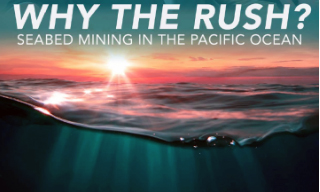The Pacific Ocean is the scene of a new Wild West. Companies and their investors, hungry for profits, are driving a speculative rush for seabed minerals. Donor government-supported programs that promote the development of ‘responsible’ seabed mining regulations provide aid.
THE PERILS OF DEEP SEA MINING. Deep Sea Mining (DSM) is as yet an unproven industry hoping to extract minerals deposited on the sea floor at depths below 200m. The metals sought include iron, manganese, copper, zinc, lead, nickel, cadmium, silver, platinum, cobalt, rare earths, and gold. There are 3 distinct types of ore deposits found in deep seabeds: (i) ferromanganese nodules; (ii) cobalt crusts; and (iii) seafloor massive sulphides. Very little is known about the potential impacts of DSM. These uncertainties are due to the experimental nature of mining, lack of knowledge about the deep ocean ecosystems, and the ways in which these connect with marine food webs. The only certainty is direct and indirect impacts at every stage of the mining process.
WHOSE INTERESTS WILL NEW REGULATIONS BE SERVING? The development of seabed mining regulations, at both Pacific regional and international levels is occurring in haste in the absence of meaningful public debate and with little consideration of the precautionary principle and the free, prior and informed consent of the Pacific Island citizens who would be adversely affected by this unprecedented industry. The processes surrounding the seabed mining regulations appear to be pushed along by would-be DSM companies and skewed towards their interests. It is questionable whether the International Seabed Authority (ISA) – the United Nation’s (UN) agency responsible for managing seabed resources outside national jurisdictions and charged with developing DSM regulations for this area – is in fact able to serve the interests of its member states and the environment it is mandated to protect.
The Secretary-General of this UN body, Michael Lodge, actively promotes the commercial interests of one seabed mining company, DeepGreen Metals Inc, in the company’s advertising videos and in orchestrated panels at meetings of Pacific Island political leaders. ISA’s Legal and Technical Commission, which drafts the Mining Code, is closed to civil society participation, despite receiving direction from the ISA Assembly to meet in open sessions. The exploration licenses the ISA Secretariat has issued to DeepGreen and other companies are confidential, as are the annual reports on exploration activities that companies are required to submit to the ISA. In a move that questions the integrity of the ISA, DeepGreen’s Chief Executive Officer Gerard Barron’s close relationship with President Baron Waqa of Nauru saw him take Nauru’s seat during the February 2019 ISA meeting. He used the opportunity to promote his company and to urge the ISA towards completing the Deep Sea Mining Code. The Nauru government, responding to DeepGreen’s promises of wealth, has become the Pacific’s seabed mining champion. Nauru’s President Baron Waqa, ISA Secretary-General Michael Lodge and DeepGreen have utilized Nauru’s position as 2019 chair of the Pacific Islands Forum to promote seabed mining as the region’s economic panacea. In this, they have attempted to justify their views through the existence of the Regional Legislative and Regulatory Framework and more recent draft regional agreement on seabed mining developed by the Pacific Community (SPC) and European Union funded DSM programs. The SPC–EU DSM program was implemented by the SPC’s Geoscience, Energy and Maritime Division (formally Applied Geotechnical Division), which holds decades of data on surveying the sea floor body. However, these documents have been met with vocal opposition from Pacific civil society, who see them as a possible opening to massive exploitation and risk. DeepGreen’s interests are clear and unsurprising. Its financial prospects depend on the finalization of the ISA Seabed Mining Code and the Pacific regional seabed mining treaty. What is startling is the way in which the ISA Secretary-General and Nauru’s government appear willing to sacrifice their official mandates. Their duties of care for global, regional and national citizenry, and the marine environments we all depend on, are seemingly being abandoned in favor of a financially, socially and environmentally risky DSM industry and DeepGreen’s commercial interests.
WHY THE RUSH? Some investors in first-mover seabed mining companies have already made handsome profits based on speculation about the possibility and the potential of DSM in the Pacific Ocean, without undertaking any actual mining. Whether or not they ever undertake any mining, DSM industry speculators are poised to reap further profits if the regulations they are pushing for are ratified. They are ready to ride the resultant wave of speculation on the value of seabed minerals and of their exploration licenses. Globally, ocean ecosystems are under stress due to pollution, plastics, overfishing and climate change. The aspirations of seabed mining companies will seriously compound these environmental stressors. In recognition of this, civil society, NGOs, fisheries, tourism operators, scientists and governmental bodies around the world are calling for a moratorium on DSM. The European Parliament adopted a resolution on international oceans governance in January 2018 that called on European states to stop sponsoring DSM exploration in international waters and to support a moratorium on DSM.
This call has been echoed by the Environmental Audit Committee of the UK House of Commons since 2018, the UN Envoy on Oceans at the World Economic Forum in Davos, and Fiji’s Bainimarama government announced in June 2019 that it will ban sea-bed mining in its waters. Scientific research continues to add to the grim pool of knowledge about our oceans’ declining health and their importance as planetary life support systems. A moratorium on DSM is the only safe recourse. The urgency of the species extinction crisis we now face demands a moratorium on the development and adoption of seabed mining regulations as well as the issuing of exploration and exploitation licenses in national and international waters.
